
Priority Issues Identified by JSR Group
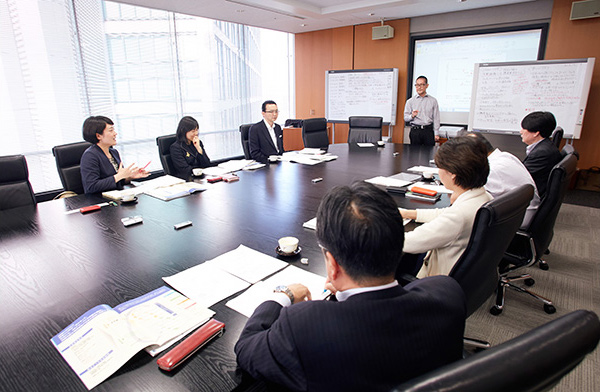
As part of our efforts to promote sustainability in society and the global environment through the integration of management and CSR, we identified and disclosed priority issues in the CSR Report for the first time in FY2016.
During this fiscal year, we have focused on the following four priority issues: Safety and Disaster Prevention; Environmental Impact and Resource Reduction, and Climate Change Countermeasures; A Sustainable Society where People Can Enjoy Health and Longevity; and Communication with Stakeholders. To prepare for more detailed and specific CSR activities in the future, we have gathered and exchanged opinions with a variety of stakeholders and experts in various fields to analyze issues. The JSR Group aims to reaffirm the importance of implementing CSR activities through its business, and we are confident this will facilitate better disclosure of information to a wider range of stakeholders.
Going forward, we plan to incorporate newly identified priority issues, and advice and opinions discussed during this dialogue into future activity plans.
- <Date>
- April 19, 2016
- <Location>
- JSR Headquarter Executive Meeting Room
- <Participants>
- Experts:
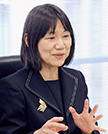
One AkiyamaPresident
IntegreX Inc.
Ms. Akiyama graduated from Keio University with a degree in Economics and joined a foreign-affiliated securities company, where she worked as a trader. After completing her Master of Finance at Aoyama Gakuin University in 1998, she again worked at a securities company before establishing IntegreX Inc. in 2001, through which she works to popularize socially responsible investing. She is also a certified CPA in the United States. Her chief publications include "What is Socially Responsible Investing (SRI) - Supporting good companies for the long term."
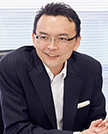
Hiro MotokiPresident
E-Square Inc.
After graduating in Economics from Rikkyo University, Motoki worked as an IT consultant, strategy consultant, and environmental consultant for the Deloitte Touche Tohmatsu Group from 1992. From April 2001, he was the director of the Consulting Division at E-Square, where he provided support to large-scale companies in a wide range of industries. Areas of support included CSR strategy, communication, training, business development, etc. He has served as President and CEO since October, 2011.
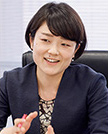
Sayaho NodaDirector
Caux Round Table (CRT) -Japan
Ms. Noda holds a BA in International and Cultural Studies from Tsuda College and a MA in Public Administration and Public Policy from the University of York in the UK. After engaging in environmental NGO and training NPO activities, she joined CRT Japan. She currently acts as a CSR consultant and instructor for the GRI-certified G4 training program.
JSR: Titles are as of the time of the dialogue
Hayato Hirano Director (Accounting & Finance, Human Resource Development, Corporate Communications, and Group Companies)
Nobuo Kawahashi Senior Officer (Research & Development)
Mika Nakayama Officer (Diversity Development and Corporate Planning)
Kazumi Nejigaki General Manager (CSR)

*Hirano, Kawahashi, Nakayama, and Nejigaki from the left
Discussion on the Future of JSR Group's CSR
- NEJIGAKI :
- JSR Group CSR in FY2016 was based on the Corporate Mission to create value through materials innovation to enrich the society, people and the environment, and the goal of integrating business management and CSR. A unique part of this has been the systematization of our activities into active CSR, which aims to address social issues through business activities, and passive CSR, which forms the base of sustainable business activities.
In planning JSR Group CSR activities for FY2017, we have identified and organized current issues corresponding to our Corporate Mission as priority issues. Last year, we identified and selected priority issues based on core subject areas and issues related to the ISO 26000 International Standard for social responsibility of organizations. This year, we have further expanded the scope of issues that the JSR Group recognizes by including the Sustainable Development Goals (SDGs) selected by the United Nations General Summit in September 2015 as well as other issues identified by major companies.
Figure A illustrates the reorganization of priority issues by the CSR Department after dialogue with customers, investors, employees, and other stakeholders.
I look forward to frank discussion about the processes required to establish and organize priority issues.
Fig. Matrix of priority issues in the Verification Process
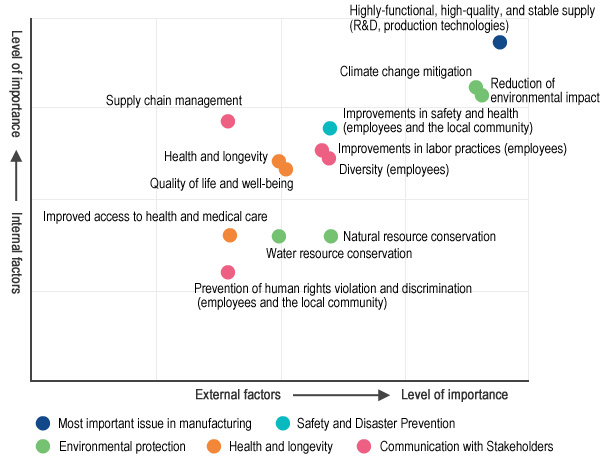
Importance of the Process for Determining Priority Issues
- AKIYAMA :
- Integrating the Corporate Mission, CSR, and activities to address issues facing society is quite admirable. Furthermore, continuing efforts to constantly review what has been established every year is also noteworthy. I feel this is an excellent foundation for CSR. The reviewed CSR priority issues have been clearly organized, and this has made it easier to tackle them. The actual identification process itself is quite thorough and appropriate.
On the other hand, having a respectable Corporate Mission system and engaging in activities based on it is difficult to visualize through the selected priority issues alone. I think it would be great to illustrate in an easy-to-understand manner how each of the organized priority issues corresponds to the Corporate Mission and individual corporate activities.
As governance, compliance, and risk management form the fundamental basis of corporate activities, these areas should be addressed as well.
- MOTOKI :
- It is evident that JSR understands the need to periodically review what has been established, and makes adjustments accordingly. It is also clear that JSR studies identified priority issues thoroughly and places importance on the process. I felt that incorporating ideas, concerns, and opinions from various stakeholders into the process was especially admirable. In priority issues, placing "High-quality, and stable supply," which represent the strength of business activities at the top of the upper-right of the figure shows the attitude of active CSR. I also commend the positioning climate change mitigation, reduction of environmental impact, and improvements in safety and health directly under it.
- NODA :
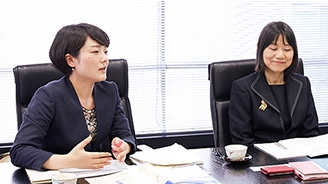 The first thing I noticed after reading CSR Report 2015 was the clear executive commitment toward CSR. There are very few companies in Japan that demonstrate a sincere desire to integrate management with CSR, and one that actually follows through is rarer yet. I felt the JSR Group is one of the very few companies that demonstrate this. I do not know any other company that holds a CSR Report Presentation Meeting every year to disseminate its commitment to employees. Chemical manufacturers also handle toxic raw materials and bear the risk of significantly affecting society in the event of an accident. As this also affects the company brand, ensuring that employees have a high sense of ethics and awareness regarding the Corporate Mission is crucial. From this perspective as well, the CSR Report Presentation Meeting is truly a wonderful activity.
The first thing I noticed after reading CSR Report 2015 was the clear executive commitment toward CSR. There are very few companies in Japan that demonstrate a sincere desire to integrate management with CSR, and one that actually follows through is rarer yet. I felt the JSR Group is one of the very few companies that demonstrate this. I do not know any other company that holds a CSR Report Presentation Meeting every year to disseminate its commitment to employees. Chemical manufacturers also handle toxic raw materials and bear the risk of significantly affecting society in the event of an accident. As this also affects the company brand, ensuring that employees have a high sense of ethics and awareness regarding the Corporate Mission is crucial. From this perspective as well, the CSR Report Presentation Meeting is truly a wonderful activity.
I think that the process of identifying CSR priority issues can be praised and even compared with international standards. The selected issues are important in the chemical industry.
Having said that, I had some questions about the level of importance of the issues from a stakeholder perspective in Fig. Instead of being grouped into one of these issue categories, it may be more effective to leave some of these priority issues ungrouped.- HIRANO :
- As Ms. Noda mentioned, the President talks about executive commitment to CSR from various perspectives. I myself have also continued to improve JSR Group CSR and feel that there are no major negatives at this moment. However, I think that CSR is something that needs to be constantly improved. I would like to use this opportunity to clarify the types of initiatives we should institute in the future.
- NAKAYAMA :
- The Corporate Planning Department manages activities that increase awareness about the Corporate Mission throughout the company, and the persons in charge in each department participate on a semi-voluntarily basis. In other words, we have been able to raise awareness because they feel the same way and act with enthusiasm.
Making the relationship between priority issues and corporate activities easy to understand is key in raising awareness about the Corporate Mission and CSR. I always express the opinion that we must think and act on a daily basis through business activities based on the relationship between the Corporate Mission and CSR. Highly-functional, high-quality, and stable supply are about products, and having that in the upper-right of Fig. is a perfect representation of "Materials Innovation." This certainly is characteristic of the way we think of CSR. However, if the relationship between our Corporate Mission and our products is not clear to the public, as pointed out earlier, I see finding ways to explain it as an important future issue.
- NEJIGAKI :
- As Ms. Akiyama pointed out, there certainly are some rough edges in the relationship between issues facing society and business. One is to understand that expectations from society and stakeholders are reflected in the content of questionnaires conducted by external rating agencies. Hence it is of importance to recognize which social issues are considered the most important and think about how to relate them to business. As we regard these as medium- and long-term issues, we have not yet organized them completely. Going forward, I trust we can identify what we can do as the JSR Group, what we should do, or what can be considered as business opportunities.
We have been rather successful in increasing employee awareness about the Corporate Mission through dialogues between executives and employees as well as other activities. I hope that these activities will help employees to consider how these social issue initiatives will create corporate value and how we can find new business opportunities through these initiatives.
- FY :
- Fiscal Year means the year ending March 31.
For example, FY2016 means April 1, 2015 - March 31, 2016
To Dialogue 2 "Importance of Understanding Priority Issues from a Global Perspective"







 The first thing I noticed after reading CSR Report 2015 was the clear executive commitment toward CSR. There are very few companies in Japan that demonstrate a sincere desire to integrate management with CSR, and one that actually follows through is rarer yet. I felt the JSR Group is one of the very few companies that demonstrate this. I do not know any other company that holds a CSR Report Presentation Meeting every year to disseminate its commitment to employees. Chemical manufacturers also handle toxic raw materials and bear the risk of significantly affecting society in the event of an accident. As this also affects the company brand, ensuring that employees have a high sense of ethics and awareness regarding the Corporate Mission is crucial. From this perspective as well, the CSR Report Presentation Meeting is truly a wonderful activity.
The first thing I noticed after reading CSR Report 2015 was the clear executive commitment toward CSR. There are very few companies in Japan that demonstrate a sincere desire to integrate management with CSR, and one that actually follows through is rarer yet. I felt the JSR Group is one of the very few companies that demonstrate this. I do not know any other company that holds a CSR Report Presentation Meeting every year to disseminate its commitment to employees. Chemical manufacturers also handle toxic raw materials and bear the risk of significantly affecting society in the event of an accident. As this also affects the company brand, ensuring that employees have a high sense of ethics and awareness regarding the Corporate Mission is crucial. From this perspective as well, the CSR Report Presentation Meeting is truly a wonderful activity.